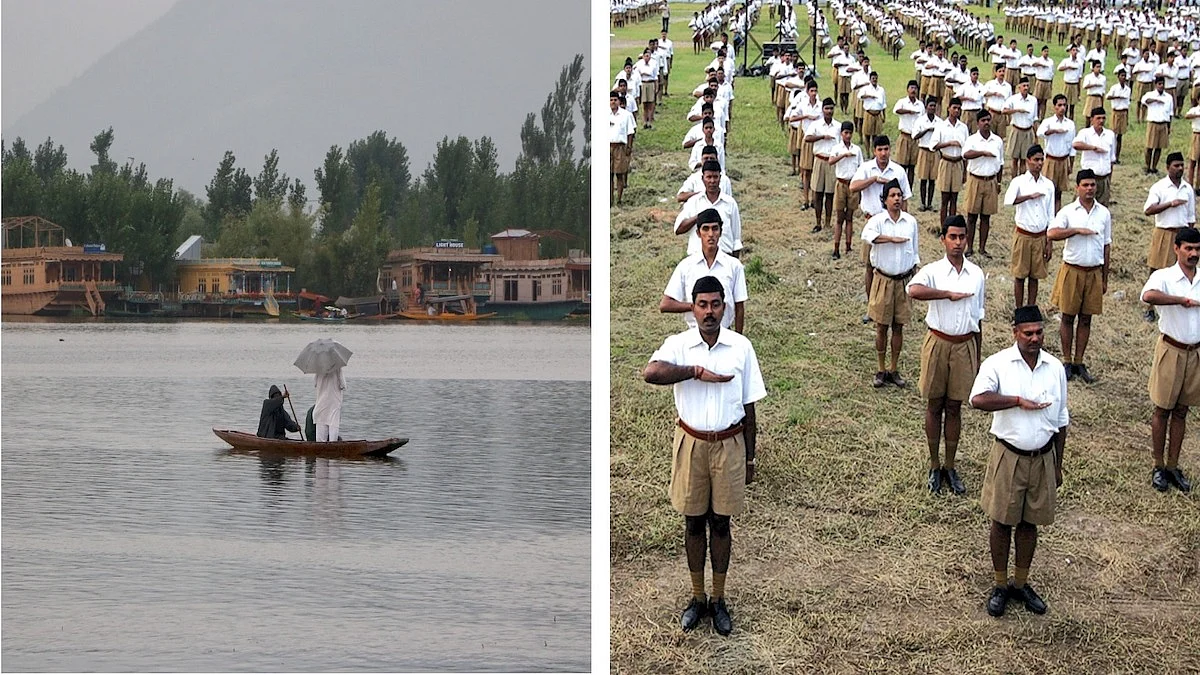RSS-BJP out to obliterate historical legacy and identity of Kashmiris
The right-wing forces are slowly but surely implementing their agenda of disenfranchising and politically marginalising the Kashmir Valley’s populace

The Jammu and Kashmir administration is taking steps which seek to obliterate the historical legacy and identity of the Kashmiri people while promoting measures which will heighten the communal divide between Jammu and the Valley.
July 13 has been traditionally observed as Martyrs Day in Kashmir to commemorate the memory of 22 people who were killed in firing by the maharaja’s police in 1931 while protesting against the feudal monarchy.
For the second consecutive year, there was no official commemoration of the event. In 2020, the Union Territory administration withdrew state patronage to Martyrs Day when usually a wreath was laid at the graves of the martyrs by the head of the state government. It is also no longer a government holiday. The gates of the martyrs’ graveyard were locked and barricaded.
This disavowal of a historical date which has resonance for the people of Kashmir is another attempt to disempower the people of the Valley.
Following this, the administration has announced that the birthday of the former Maharaja Hari Singh on September 23 would be observed as a public holiday. This followed a request from various organisations in Jammu. The maharaja symbolised autocratic feudal rule under British patronage of the system of princely states. The National Conference, with its leader Sheikh Abdullah had led the peoples’ movement against feudal rule and against British suzerainty – a continuation of the struggle which saw the martyrdom of 22 people in 1931.
While the maharaja’s birthday has been declared a public holiday, Sheikh Abdullah’s birthday observance has been discontinued since December 2019.
The maharaja’s role at the time of independence was a dubious one. As per the Mountbatten Award, princely states could choose which of the two independent states to join – India or Pakistan. The maharaja, who had unleashed severe repression against the popular movement led by the National Conference for an end to monarchy and for democratic rule, wanted Jammu and Kashmir to remain an independent state and not join either of the two new dominions.
This is a fact admitted by him in a letter to Mountbatten dated October 26, 1947. He wrote the letter enclosing the instrument of accession to India after Pakistan sent armed ‘tribal invaders’ to annex Kashmir.
It is the resistance put up by the people led by the National Conference, while the maharaja fled from Srinagar to Jammu, that helped the Indian Army, when it was dispatched, to drive out the invading forces.
The maharaja, at the time when he was contemplating independence, was fully backed by the RSS and later by the Praja Parishad which was run by RSS cadres. They had endorsed his stance for independence and later after the accession, separation of Jammu from Kashmir.
It is this maharaja, an erstwhile ally of the British, who is being honoured with a state holiday while those who struggled against the monarchy and fought for democracy are being de-recognised. In honouring the maharaja, the fact that he was a Hindu who ruled over a majority of Muslim subjects seems to be a crucial factor.
The attitude of the BJP rulers to Hari Singh who sided with the British and wanted J&K to be an independent state is in stark contrast in its attitude to Nizam of Hyderabad. The BJP observed ‘liberation day’ on September 17 in Telangana hailing the Army intervention which ousted the Nizam, who also had refused to accede to India and toyed with the idea of remaining independent.
The difference in approach is determined by the religion of the ruler. The first was a Hindu and the second a Muslim – both toadies of the British.
The attitude of the RSS and the Hindu Mahasabha to the princely states at the time of independence is revealing. They were staunch supporters of the Hindu princes and rulers. They were opposed to the people’s movement in the princely states which fought against autocracy and against British rule. They prioritised the interests of the feudal rulers over the interests of the independent state of India.
In fact, V.D. Savarkar sent a telegram of support to the declaration of independence by the Maharaja of Travancore. He supported the ‘courageous determination to declare independence of our Hindu state of Travancore’, citing the decision of the Muslim ruler of Hyderabad to proclaim its independence. It is this pro-feudal, pro-imperialist outlook that still prevails among the BJP rulers.
The suppression of the historically significant dates and the symbols of the Kashmir people’s struggle against autocracy and for democracy is part of the overall plan of disenfranchise and politically marginalise the Valley population.
Aspects of this were seen in the way the delimitation of seats of the Assembly has been undertaken and the changes made in domicile status.
The old RSS plan to trifurcate J&K is back in action in a modified form. All this is sowing the seeds for a wider conflict and deeper troubles in the coming days.
(IPA Service)
Views are personal
Follow us on: Facebook, Twitter, Google News, Instagram
Join our official telegram channel (@nationalherald) and stay updated with the latest headlines
